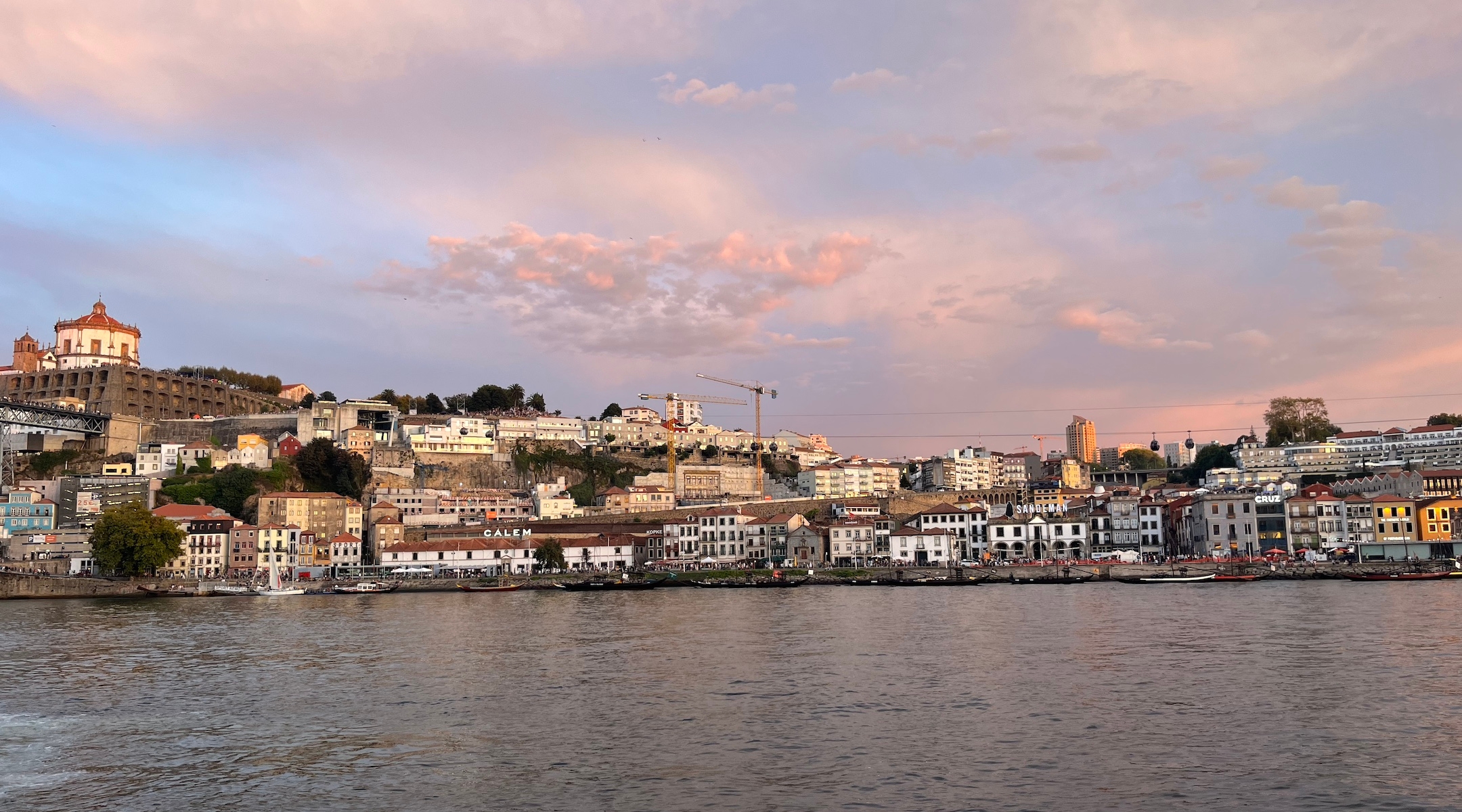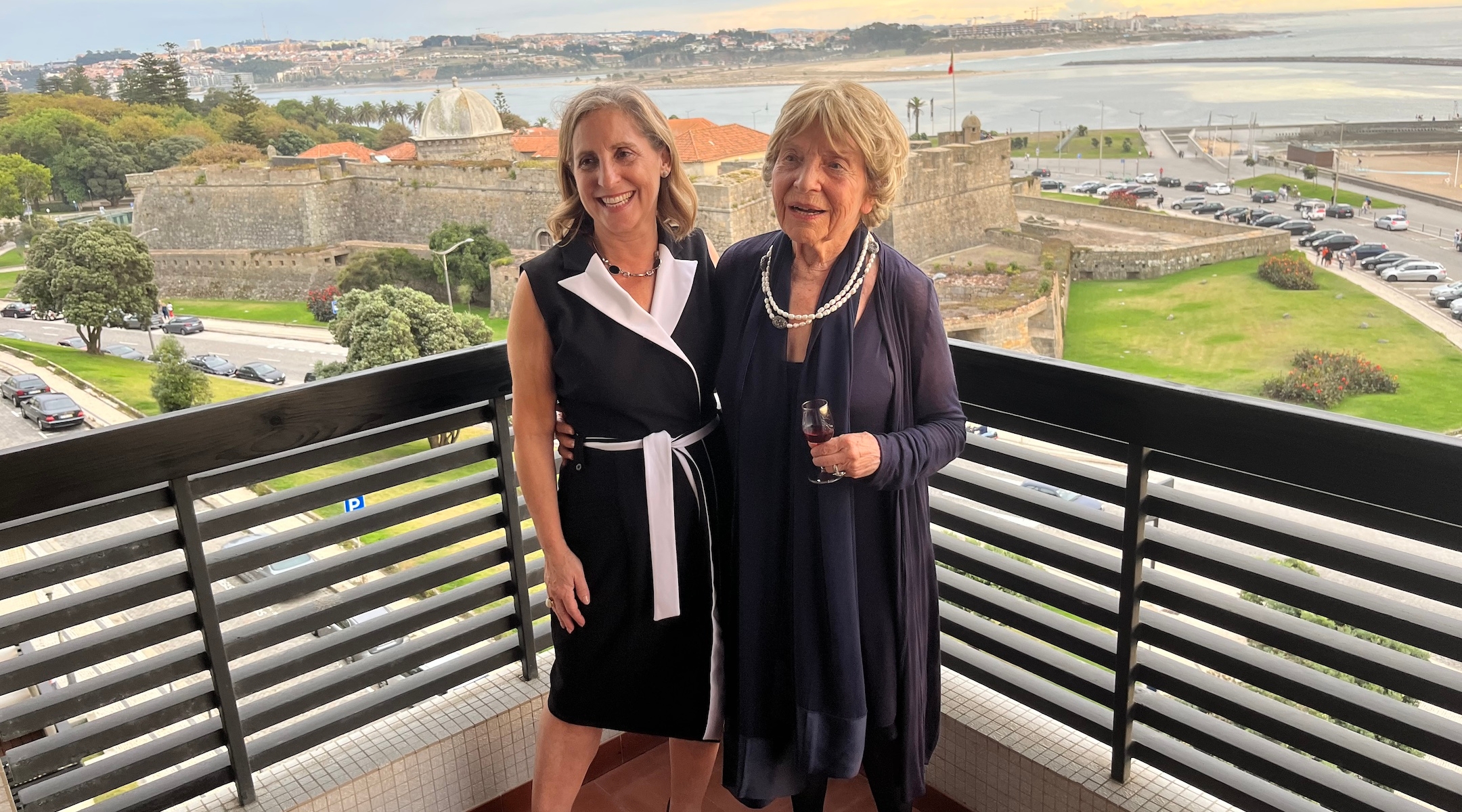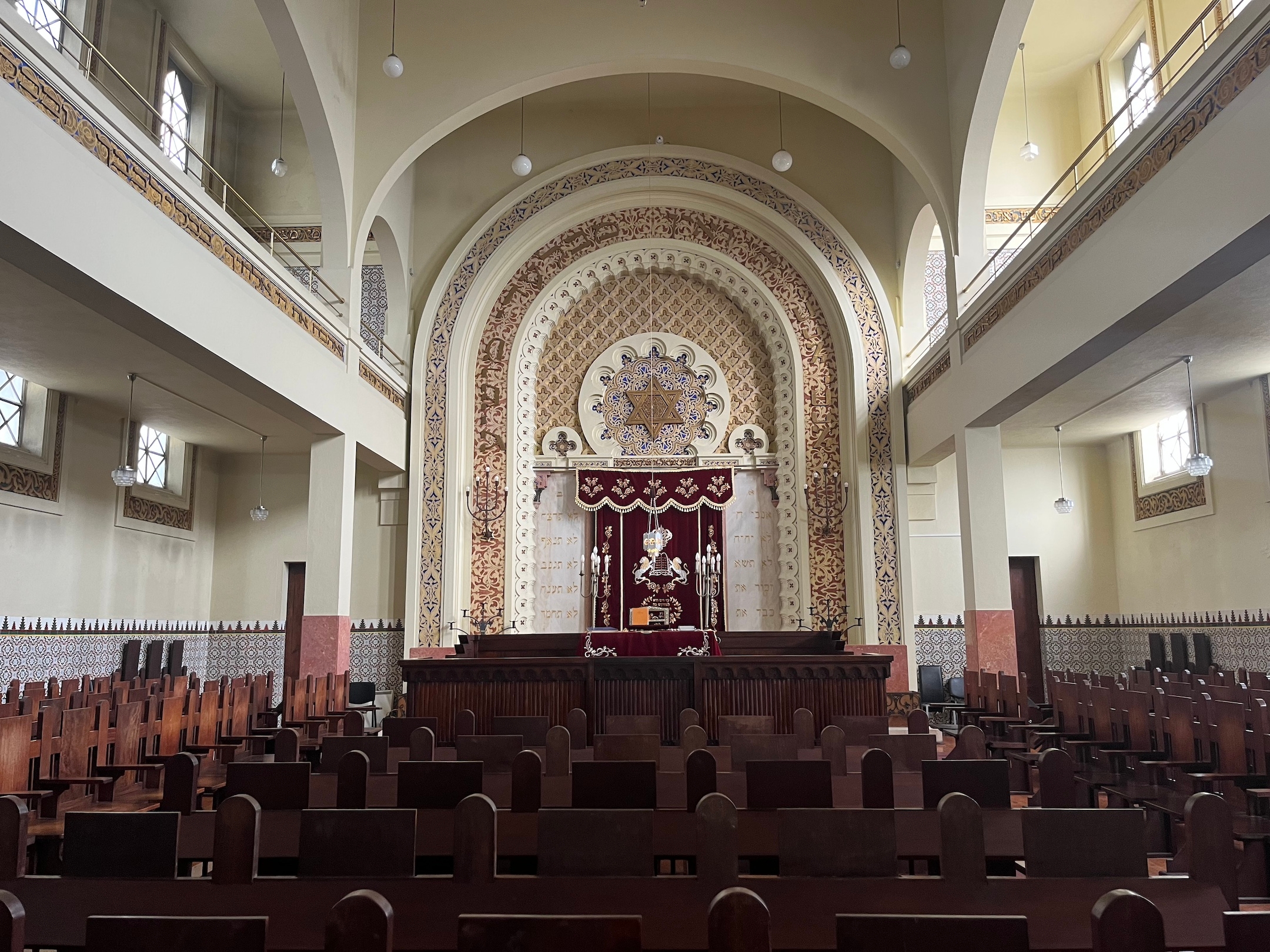The new Jews of Porto: How the Portuguese city built a Jewish community from scratch
Over the past decade, a community of roughly 1,000 Jews has materialized in Porto, thanks to a law that since 2015 has allowed the return of people whose ancestors were expelled during the Portuguese Inquisition

A view of the Douro River in Porto, Portugal. (Shira Li Bartov)
PORTO, Portugal (JTA) — In an apartment overlooking the Atlantic Ocean, 95-year-old Marilyn Flitterman habitually sits at her piano to play tunes by George Gershwin and Irving Berlin — long ago committed to memory — while looking back at the past 50 years of her life in Porto.
Born in Brooklyn, she moved to the city on Portugal’s northwest coast with her husband and children in 1970, following a work opportunity her husband found as a textile designer. Coming from a Jewish family in a “Jewish town,” she figured she would drop by Porto’s Kadoorie Mekor Haim Synagogue. The quick visit convinced her to give up on synagogue attendance.
“There was nobody there — two or three people,” Flitterman told the Jewish Telegraphic Agency.
Porto, the country’s second-largest city, whose cobblestone streets and twinkling Douro riverbank hum with tourists, was home to about 40 Jews in 2012. They couldn’t scrape together enough cash to hire a rabbi or seal a leak in the historic synagogue’s ceiling.
But over the past decade, a community of roughly 1,000 Jews has materialized in Porto, thanks to a law that since 2015 has allowed the return of people whose ancestors were expelled during the Portuguese Inquisition. Jewish locals organized a campaign of expansive outreach online and in news advertisements around the world, and an entire community of immigrants heeded the call.
Funding reaped from new residents has enabled the building of a rapid succession of institutions and Jewish tourism attractions — including a Jewish Museum opened in 2019, a Holocaust Museum in 2021 and a cemetery in 2023. The Holocaust Museum has drawn over 50,000 visitors a year since it opened, most of them Portuguese schoolchildren, said Michael Rothwell, the British-born director of the city’s Jewish museums.
“We started to reach out with any means at our disposal to the world of Jews, telling them: Look at Sepharad [Hebrew word for the Iberian Peninsula], this is where Sephardic Jews come from, come and see where it all started,” said Rothwell. “And it worked — we started having quite a few visitors, and some decided to live here.”
The community features young Jews and families from across the globe. Gabriel Senderowicz, the president of Porto’s Jewish communal board, arrived from Brazil in 2017.
“We have about 30 nationalities here — people from Israel, Mexico, Brazil, Tunisia, Turkey, France,” he said. “All continents are represented here.”
Flitterman was inspired to return to synagogue when David Garrett, a member of the Jewish board who has led the community’s revitalization, became her upstairs neighbor. Now the oldest member of a young community, Flitterman pulls up to synagogue every week in a convertible she insists on driving herself, notwithstanding her children’s reminders that she is pushing 100. During an event celebrating European Jewish culture in September, she saw 600 people fill Kadoorie’s seats to watch its choir — in a community that 10 years ago was too small to gather a minyan, or prayer quorum of 10 men.

Marilyn Flitterman poses in her apartment with her daughter Dara. (Shira Li Bartov)
By the end of 2022, about 75,000 people were granted Portuguese citizenship through the Sephardic nationality law. But the future of Jewish migration to Portugal may be determined by the country’s next government.
Portugal will hold a snap election on March 10, following Prime Minister Antonio Costa’s resignation amid charges of corruption. The recently-dissolved parliament advanced a bill to end the law for descendants of Sephardic Jews — partially because of a scandal that rocked the local and international Jewish community last year — and the measure is frozen until the new government takes shape. In Spain, a similar law of return that gave 36,000 applicants citizenship ended in 2019.
An international scandal
In March 2022, federal police raided the Kadoorie synagogue and arrested Rabbi Daniel Litvak on suspicion of influence peddling, document forgery and money laundering in the process of awarding Sephardic citizenship.
To apply for naturalization through the law of return, descendants must obtain certificates vouching for their lineage from Jewish community authorities in Porto or Lisbon. Porto’s authorities were accused of flouting the rules and privileging wealthy applicants in exchange for cash.
One man who received Portuguese citizenship after being certified in Porto made a particular splash across global headlines: Roman Abramovich, the Russian-Jewish billionaire alleged to have close ties with Russian President Vladimir Putin.

The Kadoorie Mekor Haim Synagogue is the largest Jewish house of worship in the Iberian Peninsula. (Shira Li Bartov)
Although Abramovich was approved by Porto authorities in 2020 and received citizenship the following year, his membership in the European Union spurred controversy only in 2022 — when it became apparent, as Russian troops amassed on Ukraine’s border, that he could live in Europe despite the EU sanctions being imposed on Russian oligarchs.
Judges in Lisbon found no evidence of bribery or fraud in Abramovich’s approval. A SWIFT payment receipt seen by JTA shows that Abramovich paid 250 euros to the Jewish Community of Porto, the standard fee paid by all applicants. Local officials told JTA that Abramovich fulfilled the same criteria as everyone else who received certification in Porto.
Initially, the Portuguese government gave community leaders significant discretion to determine Sephardic ancestry. But Lisbon and Porto interpreted the law differently. In Lisbon, applicants underwent a genealogical study and did not have to identify as Sephardic Jews themselves, so long as they could prove lineage. Porto took a route that made the process faster and easier for Jews who wanted Portuguese nationality: They needed only to show the etymology of a family surname and an attestation from their local rabbi, both of which Abramovich provided.
After the scandal, Portugal radically strengthened its law’s requirements. Applicants must now prove they inherited property from Portugal or have visited the country regularly throughout their lives. The new criteria changed the proposed purpose of the law, originally presented as a form of reparation for descendants who had lost inherited assets and were unable to return.
The unproven allegations left a scar on members of Porto’s Jewish community, many of whom still grimace at the memory. Some view the incident as a smear campaign driven by bone-deep, generational antisemitism going back to the Inquisition. The city’s Jewish authority recently sued the state for 10 million euros in compensation for its reputational harm and “political aggression” against Porto’s Jews.
“We represented everything that the society of Portugal didn’t like,” said Garrett, who has lived in Porto his entire life. “They don’t like Jewish tradition, they don’t like the Shoah museum with all the children there, they don’t like Jewish success. We were nothing, and then we were growing, and we were totally destroyed. We will never forgive this.”
Rafael Galhano de Almeida, an immigration lawyer in Lisbon, said that some Portuguese people have correlated the nationality law with antisemitic conspiracy theories about Jews controlling the world. However, he also noted that some critics who are not antisemitic have raised legitimate questions.
“The community that is issuing the certificate proving you are a descendant of Sephardic Jews is the Jewish community,” said Almeida. “So for some people in Portugal, there is a conflict of interest, because you are issuing the certificate when you are the interested party.”
The law’s reverberations
Porto’s new businesses hold up a mirror to its blossoming Jewish community and surge of Jewish tourism. Recent years have seen the opening of four Jewish restaurants, a kosher hotel and a kosher grocery store.
Esther Boudara and Camelia Totan, who run the popular Iberia Sababa Kosher Restaurant, both have Sephardic roots. Boudara was born in France to parents of Turkish and Tunisian origin, while Totan comes from Morocco.
The partners moved to Porto in 2019, with husbands and children in tow, after Boudara read an article promoting its Jewish community in a French newspaper.
“This article said there are a few families coming from all around the world, they speak English, Portuguese, Hebrew — and the city of Porto is asking new Jewish families to come to settle,” said Boudara. “What city in the world asks something like this?”
Boudara and Totan set out to defy the bland stereotypes of kosher food with a diverse, cross-border Sephardic menu. On any Shabbat evening, Iberia’s tables teem with groups wolfing down Moroccan lamb, Tunisian fish and Israeli salads.

Esther Boudara, left, and Camelia Totan serve a cross-border Sephardic menu at Sababa. (Shira Li Bartov)
Other Jews, like Vivian Groisman, flocked to Porto for its quality of life. Groisman grew up in Brazil and arrived seven years ago with a student visa, then obtained citizenship through the Sephardic nationality law.
“If I get pregnant, I want my kids to walk in the street and go to the park and have a calm life, with doctors and schools nearby,” she said. “In Brazil, it takes an hour or two to go to work — you don’t have this way of life where you can go walking and be somewhere in 10 minutes. It’s so expensive to have a life there.”
However, some Jewish newcomers have felt a chafing response from Portuguese natives, driven sometimes by antisemitism and sometimes by resentment over the country’s economic stratification.
The Sephardic nationality law passed in 2013, while Portugal was gripped by a severe financial crisis. During the same period, the government passed other incentives for foreign investors to infuse money in the country, such as the “golden visa” scheme that offered a Portuguese passport in exchange for a minimum investment of 250,000 euros in the country.
Property investments helped end the debt crisis, but they also fueled a two-tiered system in which wealthy foreigners have bought up entire buildings while locals, whose wages are low, struggle to keep up with soaring rents.
Some Portuguese criticize these paths to citizenship as auctions selling off their nationality to the highest bidders. They point out that many people who were naturalized through the golden visa and the law of return enjoy the benefits of an EU passport without actually living in Portugal, learning its language or integrating into its culture.
But Almeida said that no matter what Sephardic Jewish descendants choose to do, as long as the law survives, simply owning nationality is their right.
“The law was created as a reparation law,” he said. “The goal was not to send people here, it was to give them the possibility of having a citizenship that was the citizenship of their ancestors.”
This article originally appeared on JTA.org.
A message from our Publisher & CEO Rachel Fishman Feddersen

I hope you appreciated this article. Before you go, I’d like to ask you to please support the Forward’s award-winning, nonprofit journalism so that we can be prepared for whatever news 2025 brings.
At a time when other newsrooms are closing or cutting back, the Forward has removed its paywall and invested additional resources to report on the ground from Israel and around the U.S. on the impact of the war, rising antisemitism and polarized discourse.
Readers like you make it all possible. Support our work by becoming a Forward Member and connect with our journalism and your community.
— Rachel Fishman Feddersen, Publisher and CEO




















